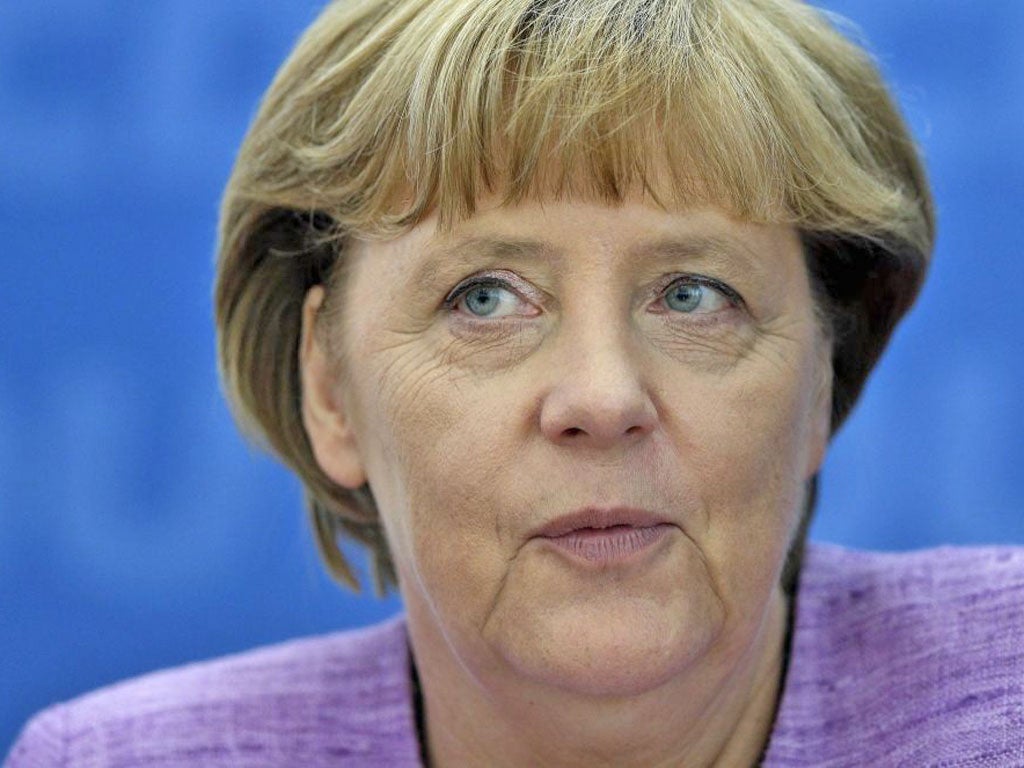Rebel conservative tells Angela Merkel: Greek euro exit inevitable by next year

Chancellor Angela Merkel attempted to face down a dispute within her coalition over her handling of the euro crisis yesterday after a rebel conservative leader insisted that there was "no way around" a Greek exit from the eurozone by next year at the latest.
The inflammatory remark was made by Alexander Dobrindt, the leader of the Bavarian wing of Germany's governing conservatives which is becoming increasingly critical of what its leading members claim is Ms Merkel's pandering to Athens.
Last week, Bavaria's conservative Finance Minister argued that more funding for Athens was like "pouring water on a desert" and demanded that Greece be "made an example of" and banished from the eurozone.
Mr Dobrindt told the Bild newspaper that, despite Ms Merkel's efforts, he saw " no way round" a Greek exit.
"I see Greece outside the eurozone in 2013," he said, adding that the country would get back on its feet more quickly by reintroducing the drachma. He also described Mario Draghi, the head of the European Central Bank, as "Europe's currency forger". His comments were a direct provocation to Ms Merkel, who publicly reassured the Greek Prime Minister Antonis Samaras at a meeting in Berlin last week that "no one" in her government wanted Greece to leave the eurozone.
In an attempt to face down mounting public dissatisfaction and growing criticism from within her own ranks over her handling of the euro crisis, Ms Merkel appeared on television on Sunday and warned politicians to "weigh their words carefully".
She added: "At the moment we have reached a very decisive phase in combating the euro debt crisis."
Ms Merkel's stand was backed by several of her conservative allies yesterday.
Guido Westerwelle, Germany's liberal Free Democrat Foreign Minister, called for the "bullying" of Greece to stop. "We are not living up to our responsibilities to Europe and the euro," he said.
The row was the latest in a series of embarrassing political disputes over Europe which Ms Merkel has had to weather since returning from holiday at the beginning of August.
The German Chancellor faces a general election next year and the combination of public discontent over the euro crisis and sniping over the issue from with her own ranks is beginning to erode her credibility.
Meanwhile, divisions over the European Central Bank's response to the euro crisis emerged yesterday after Jens Weidmann, the head of the German Bundesbank, criticised Mr Draghi's plan for the ECB to buy the bonds of ailing eurozone countries like Italy and Spain to help them lower their borrowing costs.
Mr Weidmann, who is one of the 17 eurozone bank chiefs involved in ECB policy, described the plan as "close to state financing via the printing press" and said it risked making ECB funding "addictive like a drug" for struggling eurozone governments.
Mr Draghi is expected to provide more details about his plan early next month after a meeting of the ECB's governing council.
Ms Merkel has insisted that no final decisions about Greece will be taken until after a crucial report on its finances next month.
It will be delivered by the so-called "troika" assessing Athens' fulfilment of bailout conditions – the ECB, the International Monetary Fund and the European Commission.
Greece, meanwhile, is trying to finalise a package of spending cuts to qualify for further bailout funding. Last week, Mr Samaras stressed that Greece was not seeking additional funds as it seeks to bring its economy back on track.
"We're not asking for more money," he said following his meeting with Ms Merkel in Berlin.
"We're asking for breaths of air in this dive we are taking."
Subscribe to Independent Premium to bookmark this article
Want to bookmark your favourite articles and stories to read or reference later? Start your Independent Premium subscription today.

Join our commenting forum
Join thought-provoking conversations, follow other Independent readers and see their replies